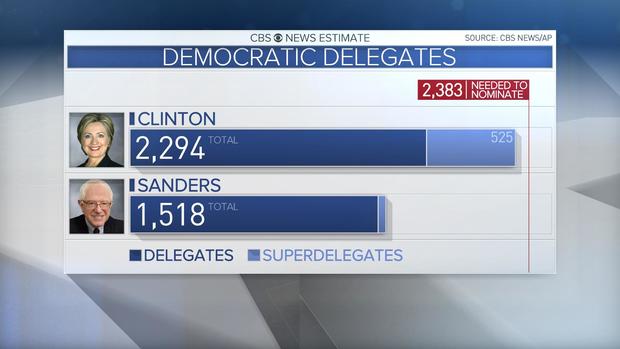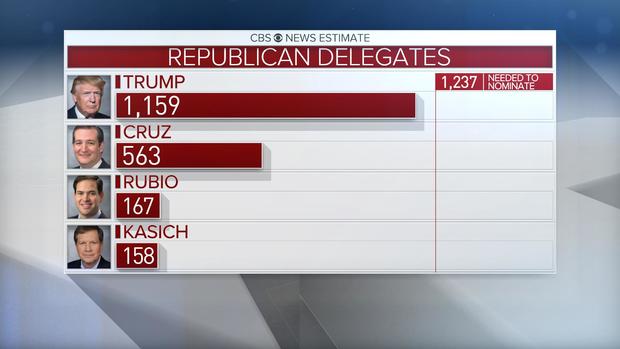2016 by the numbers: Donald Trump within striking distance of Hillary Clinton
CBS News estimates that both Hillary Clinton and Donald Trump are now within 100 delegates of the number they need to clinch their parties' nominations. And heading into the general election, the race looks tight, as national and swing state surveys show Clinton with a narrow lead - and Trump within striking distance.
The primaries wind down
Tuesday night's Democratic contests in Kentucky and Oregon delivered a split verdict - Sanders claimed victory in Oregon, while Clinton apparently secured the win in Kentucky.
Clinton picked up at least 27 of Kentucky's 55 delegates, along with 27 of Oregon's 61 delegates, bringing her total to 2,294 delegates. Including super-delegates, who are not bound by the results of their state's primary, Clinton is now only 89 delegates away from the 2,383 delegates needed to clinch the nomination. She's on track to reach that threshold in early June. And to get there, she needs to win only nine percent of the remaining delegates, including super delegates who haven't made a choice.
Sanders picked up 27 delegates from Kentucky last night, and at least 30 from Oregon. But despite making progress, his path to the nomination remains almost impossibly narrow. He has 1,519 delegates, so he needs 864 more - approximately 91 percent of the remaining delegates, including super delegates - to reach 2,383 and win the nomination.
He's claimed that he hopes to win a majority of pledged delegates by the last Democratic primary in Washington, D.C. on June 15. But that goal, too, seems to be basically out of reach: He has only 1,479 pledged delegates - 290 fewer than Clinton has - and he'd need to win about 70 percent of the pledged delegates in the remaining contests to pass her on that count. In the contests thus far, he's won only about 46 percent of the pledged delegates.
The question, at this stage, seems not to be whether Hillary Clinton will amass the number of delegates she needs to win the Democratic nomination, but how Sanders (and his supporters) will react when she does. Could he carry the fight to the convention, potentially dividing the party as Trump rallies Republicans to his banner? Or will he raise the white flag after voting concludes in June, giving his supporters the nod to line up behind Clinton?
Turning to the Republicans, Trump claimed victory in Oregon last night, adding at least 17 of the state's delegates to his total. He also picked up nine unpledged delegates from Guam. In all, he has 1,159 delegates - just 73 shy of the 1,237 he needs to seize the GOP nomination. Expect him to clear that threshold by June 7, when the final GOP primaries are held in California, New Jersey, and elsewhere.
The general election ramps up
As Trump and Clinton begin aiming their fire at eachother, some surveys released in the past week reflect a close race nationally and in several battleground states.
In New Hampshire, according to a WBUR/MassInc poll released Wednesday, Clinton is holding the slimmest of leads over Trump in the Granite State, 44 to 42 percent.
In Georgia, a poll released Sunday by the Atlanta Journal Constitution gives Democrats some reason to hope they might be able to expand the battleground in November. Clinton was only four points behind Trump in the survey, 41 to 45 percent.
"The poll gives new heft to claims by Georgia Democrats that they can turn the Peach State blue, or at least a shade of purple, for the first time since Bill Clinton's 1992 victory," the Journal Constitution reported.
Nationally, a NBC News/Survey Monkey poll released Monday found Clinton holding only a three-point lead over Trump, 48 to 45 percent. The same poll last week found Clinton with a 5 point lead.
The slight tightening of the national race in the NBC survey tracks with other polls that have also shown Trump closing the gap with Clinton since he became the GOP's presumptive nominee two weeks ago, after the Indiana primary. Clinton still leads most national surveys, but by slimmer margins than she once did - at the beginning of last month, Clinton was more than 10 points ahead of Trump in the RealClearPolitics average of national general election polls. Today, she's only 5.2 points ahead.
There may be several factors at play here: First, despite a lingering "Never Trump" movement, Trump has largely seen Republicans fall in line behind his candidacy since becoming the presumptive nominee, strengthening his own support in hypothetical match-ups against Clinton.
Second, because Clinton is still fending off Sanders in the final stages of the Democratic primary battle, she hasn't been able to benefit from a similar coalescing on the Democratic side. It's likely that she'll see her own numbers pick up if and when she clinches the nomination, but for the time being, she essentially has one hand tied behind her back.
One potential warning sign for Democrats: It's not clear Clinton will be able to count on the support of all of Sanders' voters, even if she's able to nudge the Vermont senator out of the race. According to the WBUR poll in New Hampshire, only three quarters of Sanders' backers said they'll definitely vote for Clinton, if she's the nominee. But about 25 percent say they won't vote for her - and 10 percent even said they'll vote for Trump.

